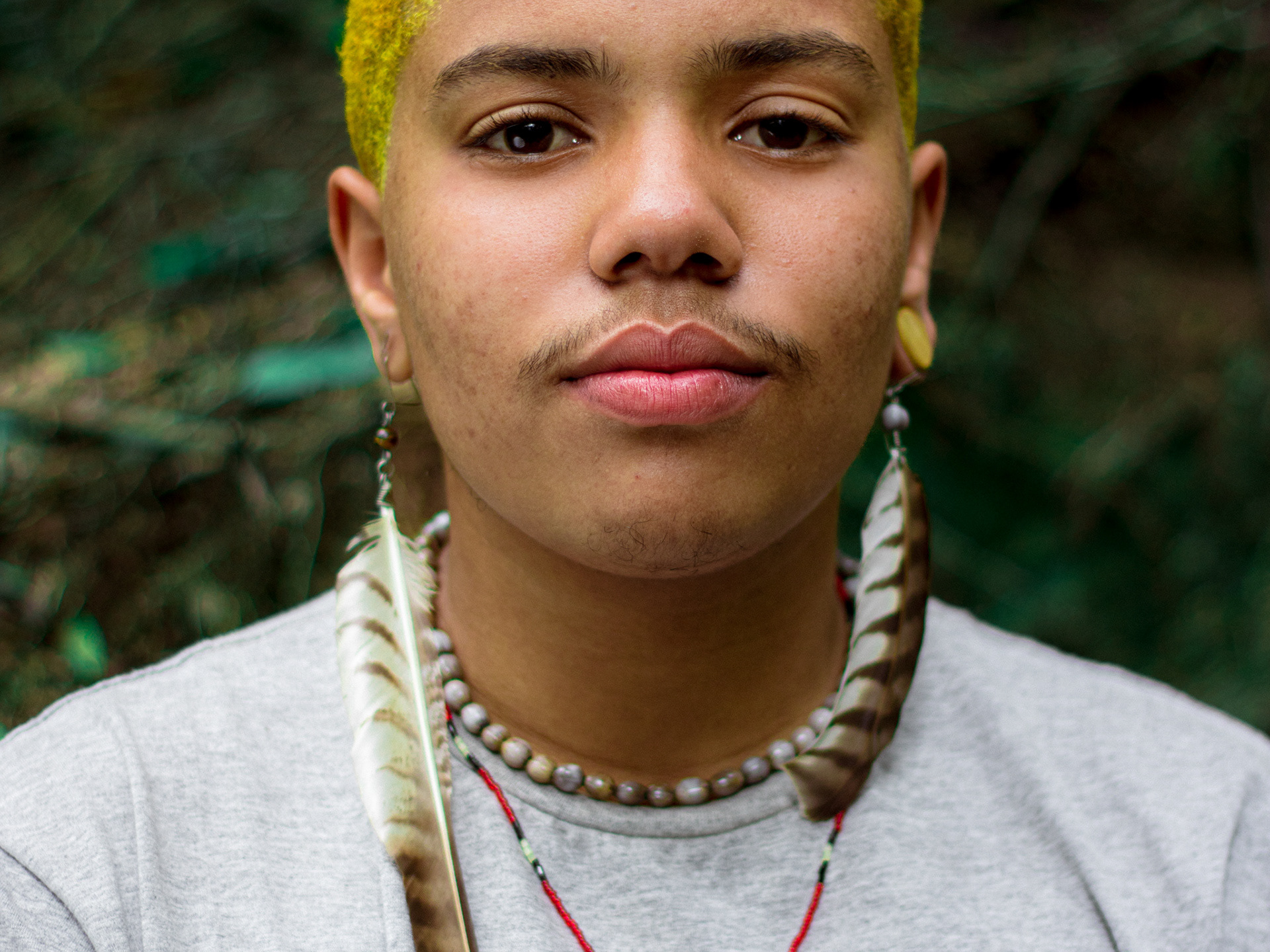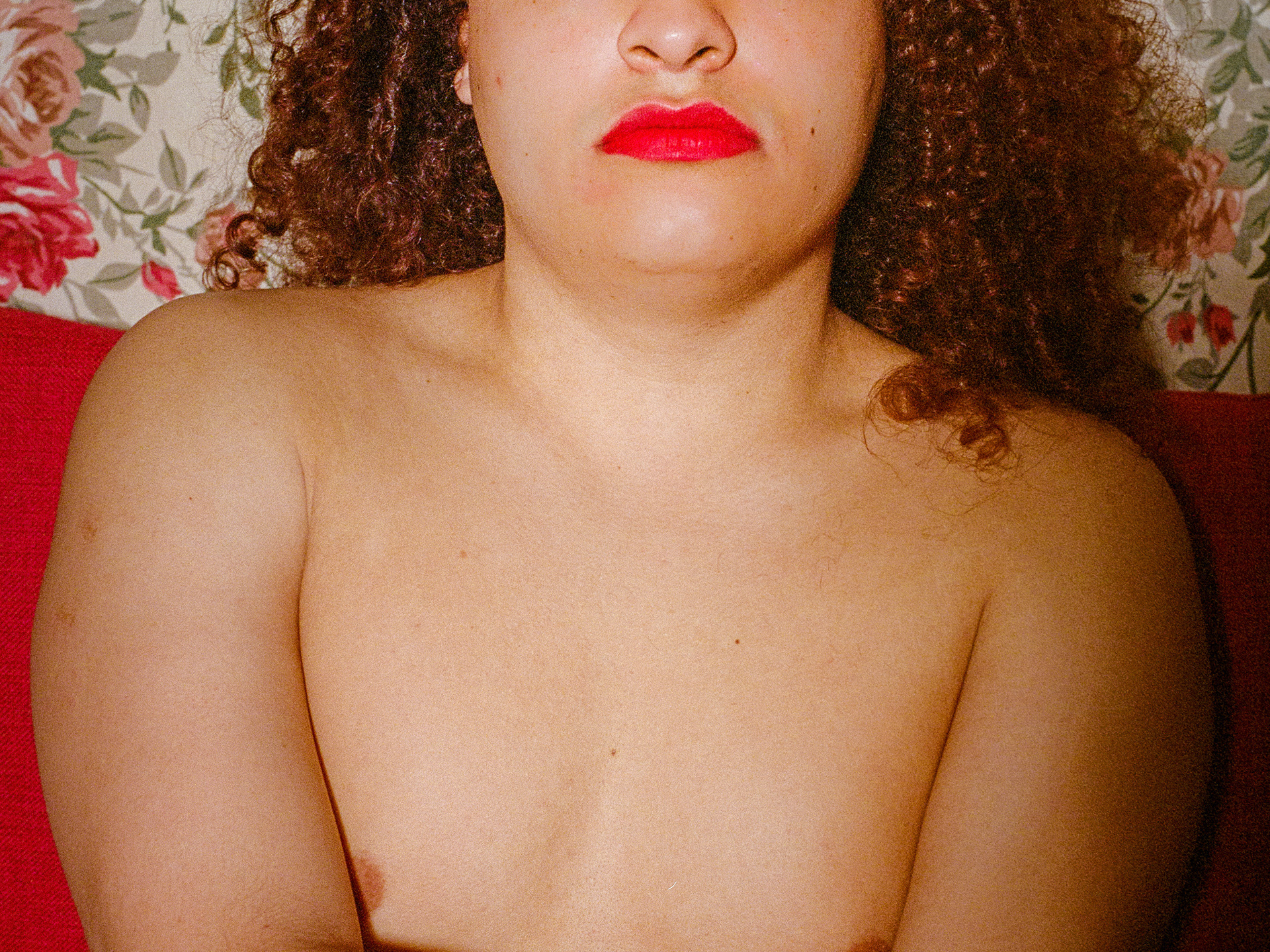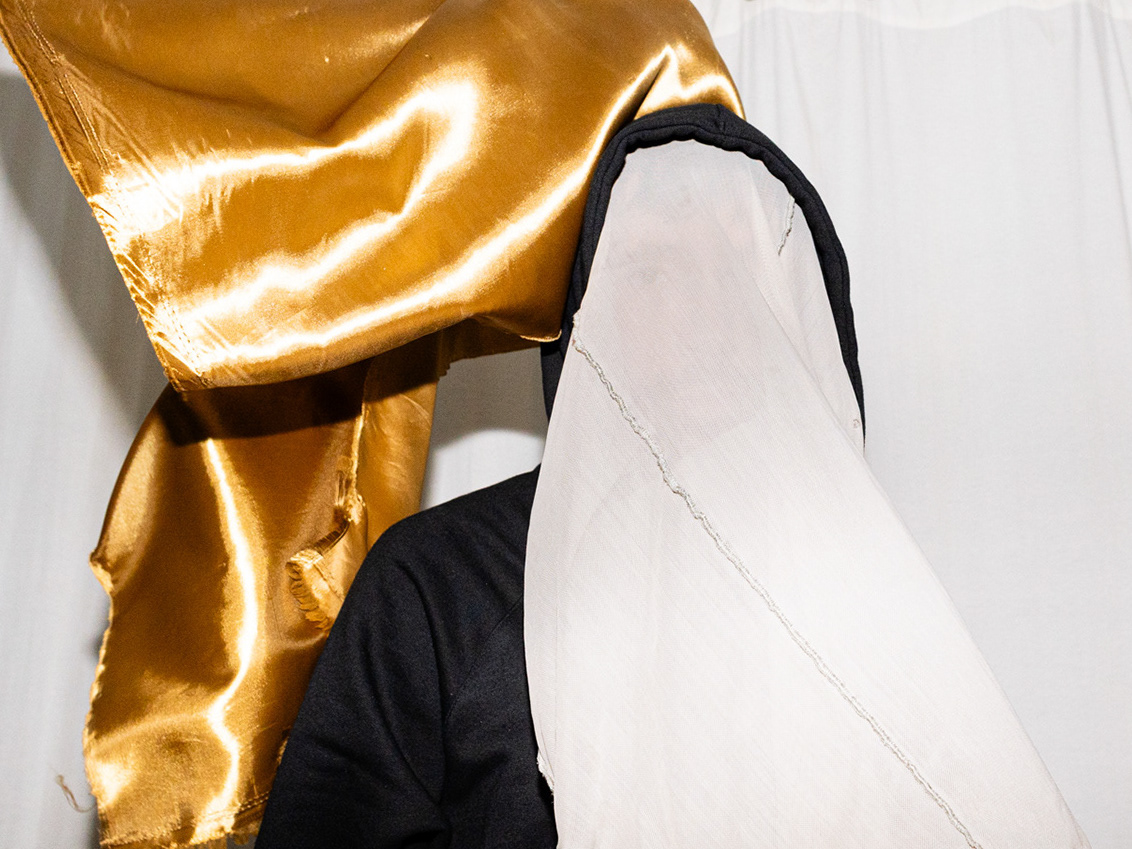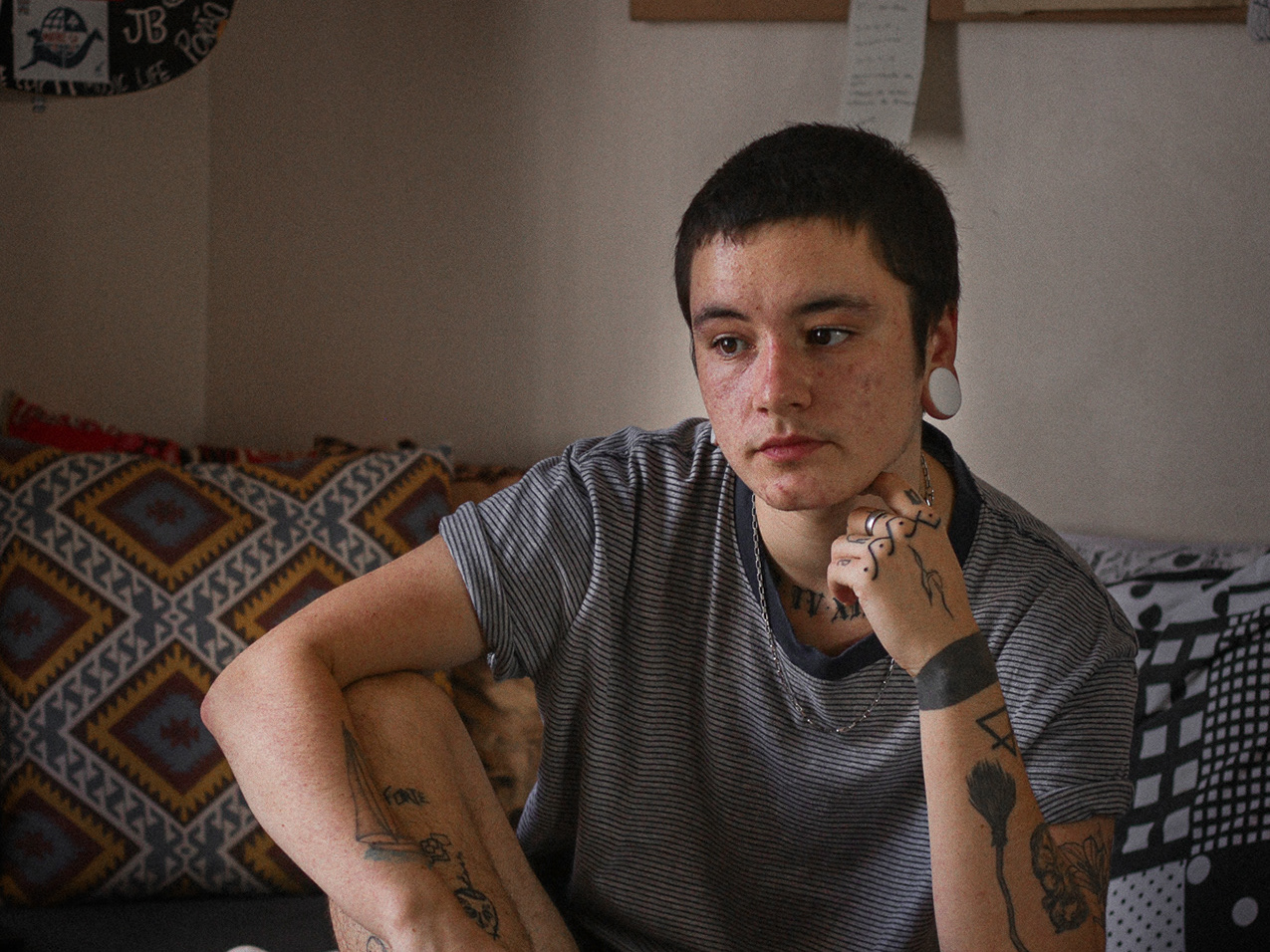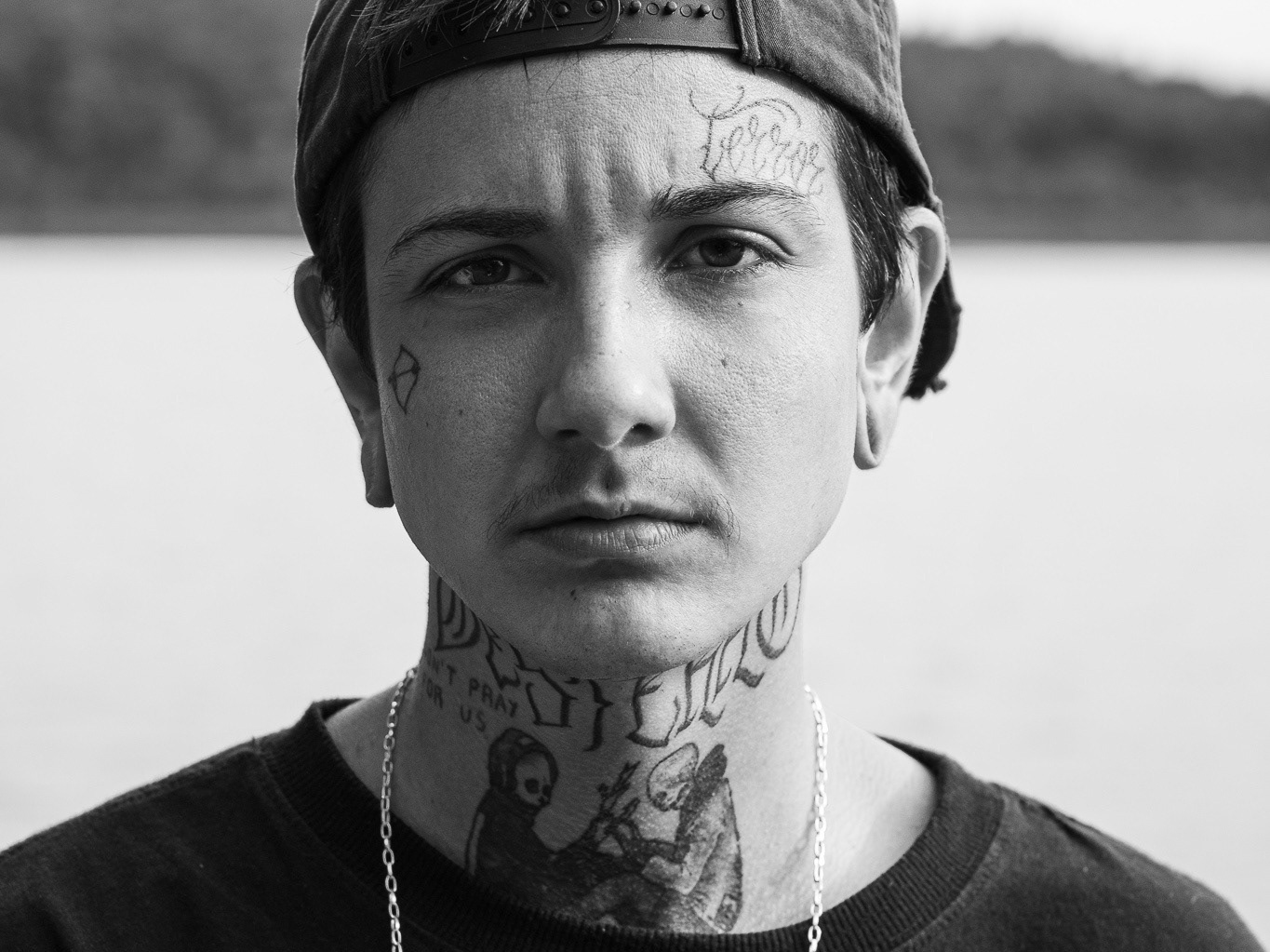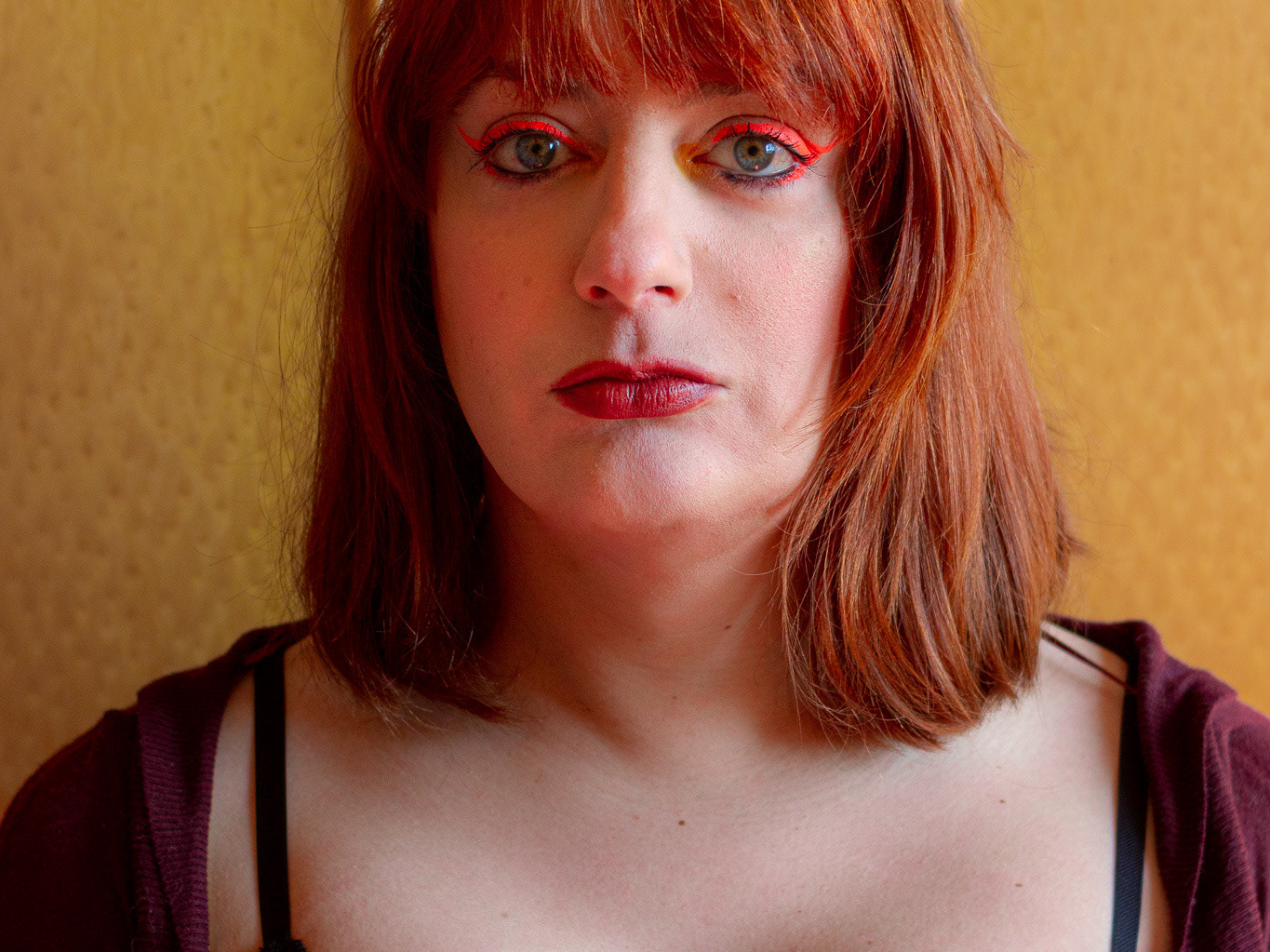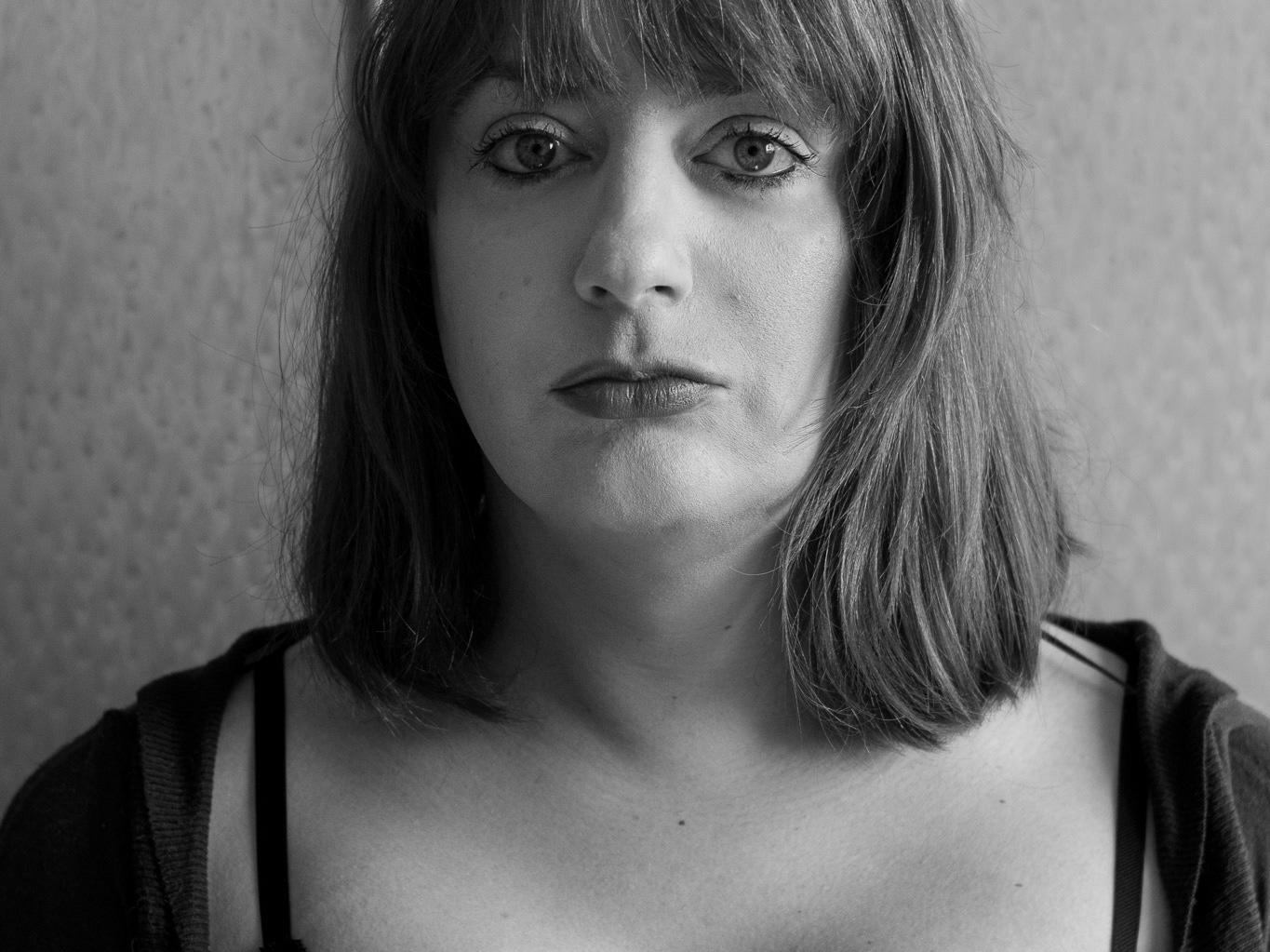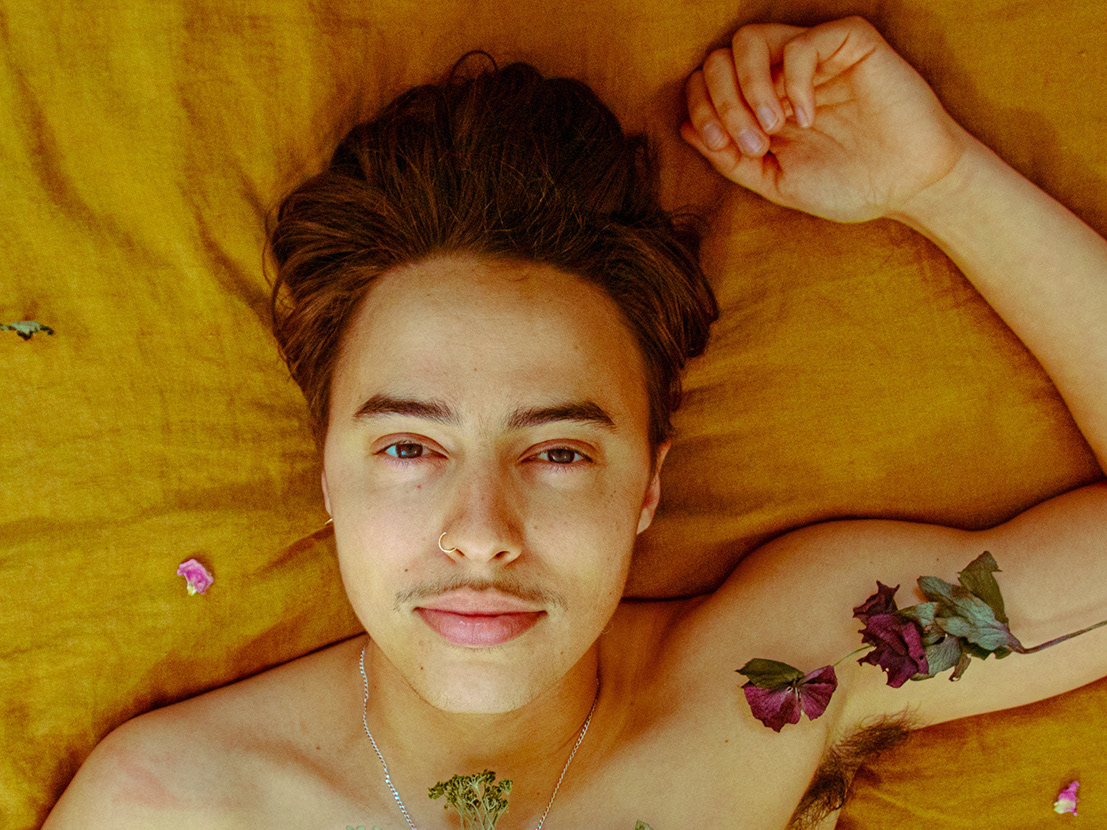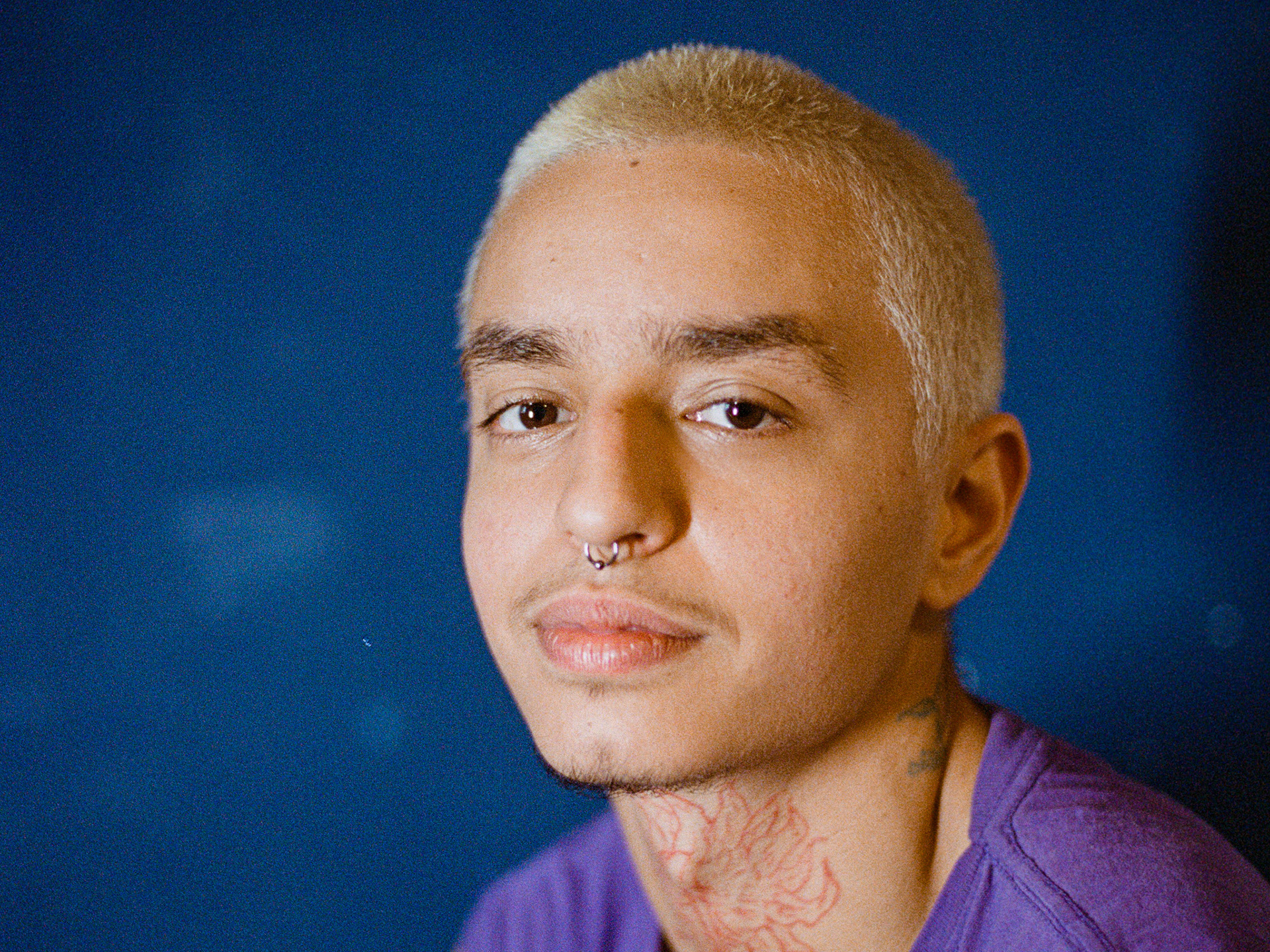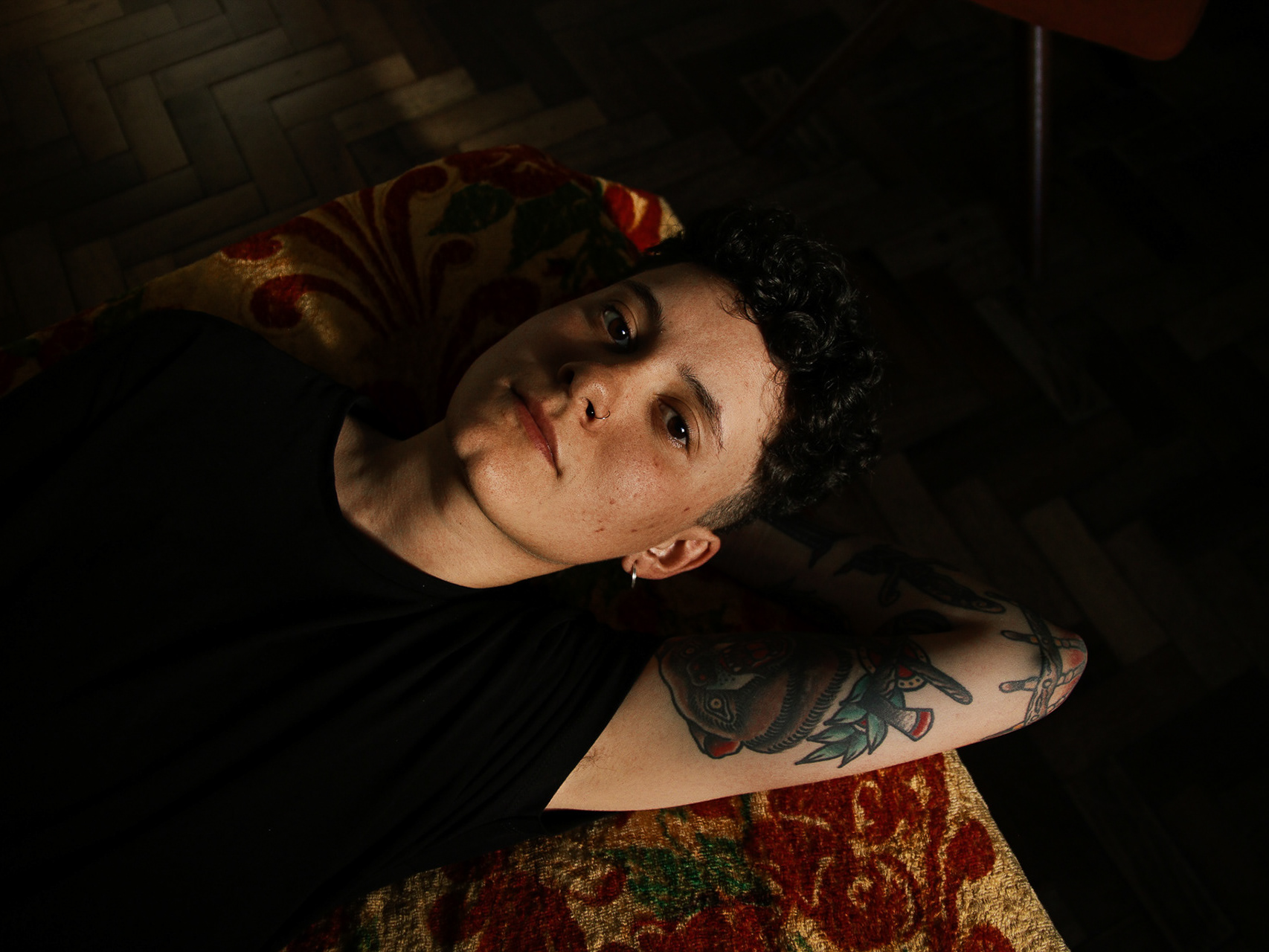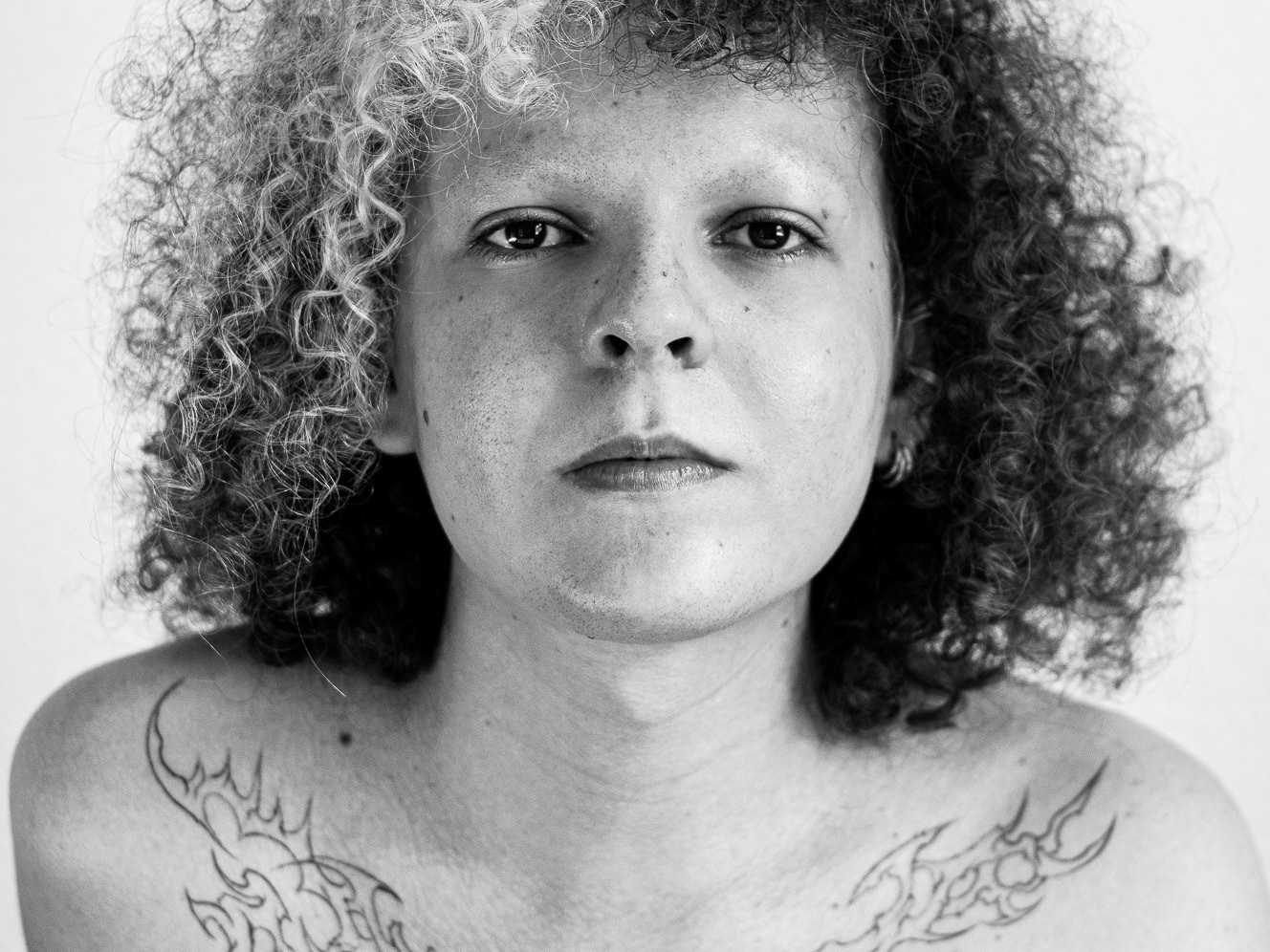Luka: I have always lived in Três Coroas. I work with theater, in a group called Tribu di Arteiros. Now, in this pandemic moment, we have been doing video projects, things like that, more sporadic work. And I also work with audiovisual, with the marketing of the group and I have been working on projects that were born from that little push of the Law Aldir Blanc. They are works in partnership with Gustavo: "Pra (a)colher" ["To welcome"] was created last year, the first edition. I also made pieces with other artists. Altogether I did 11 projects. And then I have been working with these... I don't have a steady job, but I've been working a lot on these networks of people I know, you know? And from this other works are coming. From people who are following our projects. Then I am invited to a live, or a conversation to participate… varied things.
I really like meeting people. I really like going out, exchanging ideas and talking to people. I really like meeting people beyond the usual way that we're used to meeting people. I like to meet people through talking about everything and anything, about very intimate things. I like to meet people through a hug, affection, compliments, a dance, a smile. I really like to meet people from everywhere, to think where this can lead, you know? From a job that can come up from meeting people, from a call to go out, a trip. I really enjoy being with people I don't know. Really. And to know these experiences beyond mine and other worldviews. I've been creating mechanisms to meet people. I am creating projects, businesses. I am creating these opportunities to know.
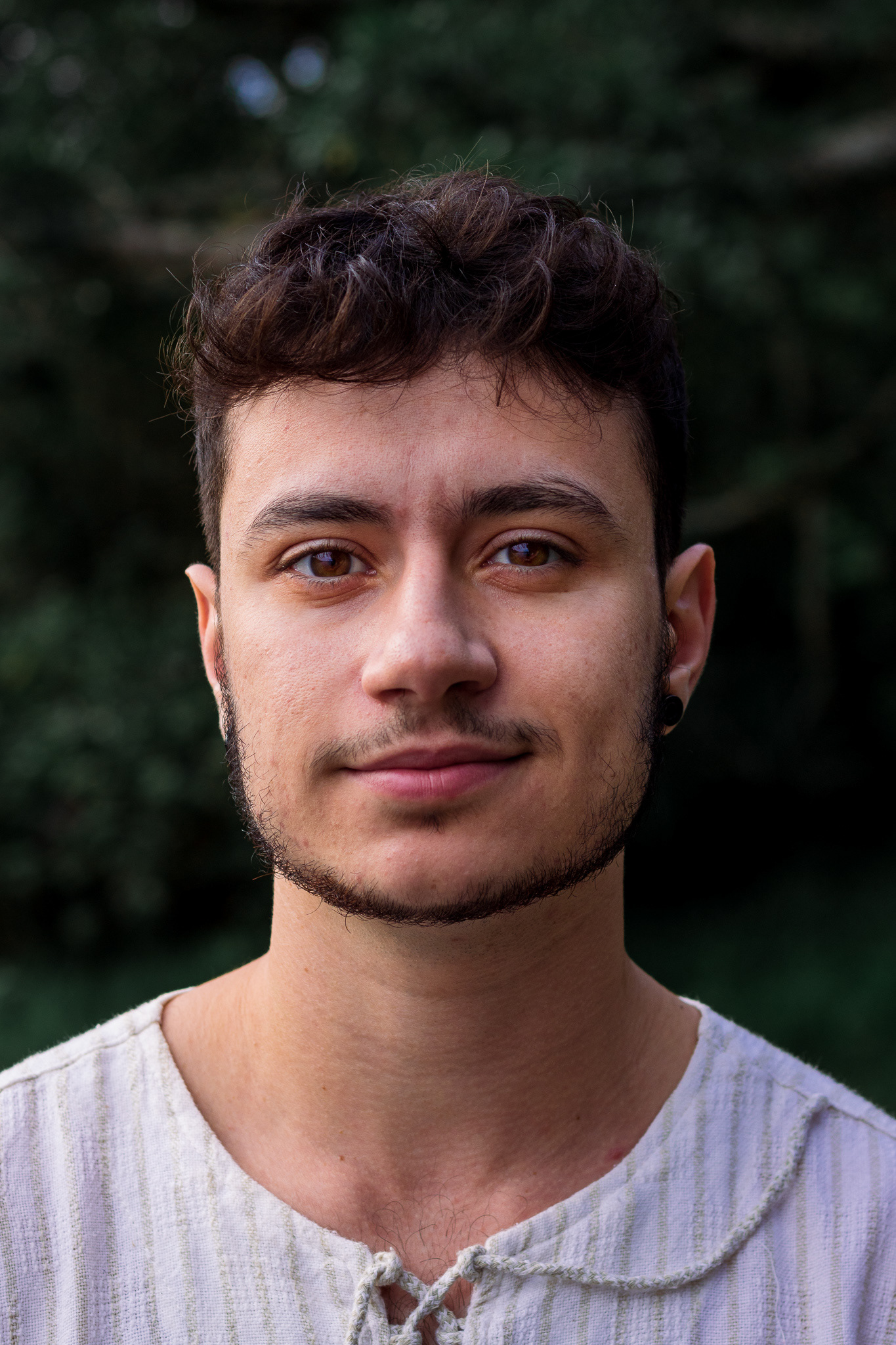
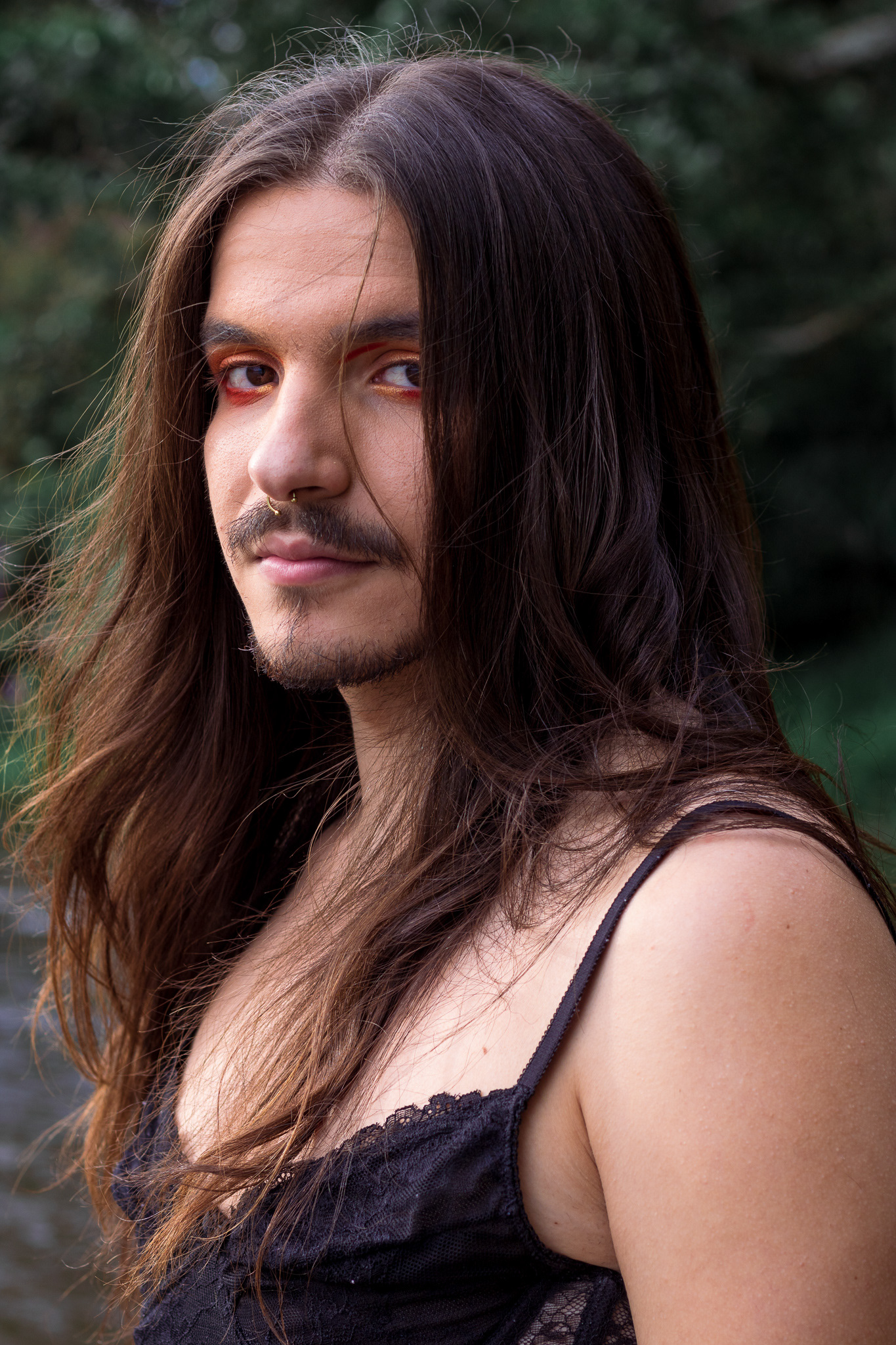
Gus: I was born in the city of Santiago, which is close to the border, where there is a very strong tradition. Then, when I was 10 years old, I moved and came to live in Bom Princípio, which is a city colonized by Germans. So it's a little bit different from there. I graduated in Theater in 2018 at UERGS (State University of Rio Grande do Sul). And I work as a theater teacher - I used to, I resigned from the job I had at Espaço da Arte (Space of Art), an Art-Education Association. I taught theater classes to several cities in the interior of the state. It made me very happy to be able to bring art to the people of the interior, since I am from the countryside and had contact with art at a very early age.
As Luka said, we are working on some projects, which are very important to me because I think that somehow I found a very cool purpose within my experience as a trans person and within my experience as an artist, you know? I think we are managing to bring the two things together in a very beautiful and very real way. And I am very happy to be able to unite to this the LGBTQIA+ activism in general, but mainly the trans activism, and to be able to use art, that was a fundamental tool in my development.
I really like meeting other people, but I like being alone too. Oh, I like to be alone always. I really like to organize my life, the things that I'm going to do. I really enjoy staying in nature, walking, visiting places. And traveling, getting to know other people's stories, getting to know people. It's not so easy for me to communicate and connect with people as Luka does, so I think it makes a nice connection, with her on the front line, meeting people and making the first contact and I coming right behind, smiling... I just wanna point out that we are very different, right? Luka has this thing of being able to express herself very well, she is able to create a very strong relationship and connection with people. She never saw the person in her life and she can get there really fast, you know? Like... I like to meet people, but I can't make this contact so easy. I think we have a very good listening space. And when I want to be alone, when I need to be alone, when I need to receive or I need to give... We are still learning how to find a balance to this movement so that each one has their time, you know, but we have always respected each other. There is a lot of respect for our choices, so it’s chill for me to say "now I don’t want", or "now I want".
Luka: We have been dating for a year. And many things that happen sometimes are due to external pressures or because of the environments we live in - because we live with our families. So sometimes it’s very difficult to think and do what we’d like at the moment we’d like. But we have great listening with each other and also a great awareness of what is happening. We know it's only for a moment.
And this place of connection comes a lot from the art. I always liked to meet and exchange with people, but I had a lot of difficulty because I was very shy. Then art came with this very welcoming hand and took me to the places I would like to go to. And it took me to a place of self-knowledge too. This connection with people comes from an intervention work that I do in the group. I work with artistic intervention: to make the street your stage, you know? We do most work at literary fairs and we have a project in which the characters are loose at the fair, walking and talking to people. Then we tell our stories. And I like to cross that line a bit... It was a construction, you know? The public helped me in this place and today I am able to cross that line, creating a very close relationship with the public, going beyond the stories, seeking the public, instead of waiting for the public to come to me. So I also lead my life this way, sometimes going to places and exchanging with people. Wherever I go, I already feel more comfortable because, due to the intervention works, I no longer have this fear of people as I did.
Gus: I think this is really crazy. We work with the same thing, we do the same things, most of our work is together. And we are so different. Like, I also do interventions, I also have this direct exchange with the public. And art didn't give me that, you know. I think I am a shy person until I get to know someone better. When I'm on stage, when I'm inside the theater, when I'm doing intervention, I access another place. And one of the things that the transition gave me was a little bit of… like, "I don't want to talk". I can see clearly the before the transition, how active I was, how I talked a lot, how I communicated with people. And after I started transitioning this changed a lot. Because I no longer felt this need to... I don't know if I would say "showing up, but I don't have this need to want to be seen, you know, the way I wanted to be seen before. And I can't tell if this is a little bit of maturity that came with time - I started transitioning when I was 20 years old. Or if it was because of the transition, you know? Like, this movement of not being as social as I was. Not to talk to people so much, to be more quiet. Because I think that with the transition I learned to like myself a lot more. So I don't see the need to, I don't know, be exaggerated, to have this communication with people so, like... I'm not saying that Luka is like this, okay? I see it as being too exposed, you know? I think that before the transition I exposed myself in a way not to be "seen", or maybe as a defense, like "I am this, this and this", you know? And then after I transitioned I didn't need to expose myself anymore. I didn't expose myself because I didn't have to defend myself from things. I think it brought me freedom.
Luka: Art is incredible, right, because whoever can dive deeply into it, have a nice experience, and have mentors who can also access these points in us... an incredible deepening overflows in us, you know. A place to really see yourself, question and look at yourself. I think I entered the Theater course to escape from myself, to live other characters and other things. And I ended up experiencing the opposite process. I ended up getting to know myself a lot more, seeing myself. Because there is no way for you to live other narratives without being whole in yours. And then I had very profound experiences. I met myself. And as this was already latent in me, of enjoying meeting people, it emerged. I think that I feel like talking to everyone now because I was so shy before Theater. I remember how bad it was when I really wanted to talk, when I was with a lot of people I didn't know and I really wanted to talk, give my opinion. And I never did, never opened my mouth to say anything, kept everything to myself.
I think that the shyness that I had makes me want to embrace and create this welcome space for people, today. I think that approaching people creates a welcoming space also for them, sometimes they are interested in talking to us, sometimes there are people looking at us, and then if we say "hi, how are you", exchange some words, they can then access what they would like to say, you know, what was inside and they couldn't speak. And this is so, so nice. So this desire to want to talk to everyone is actually a desire to want to make people feel at ease with a presence that they don't know. I really like to provide this welcome. It doesn't matter if I'm in an unknown place, but I will want to talk to someone I don't know to welcome them into this environment that is not mine, it's ours, we share.
[film photography - dev/scan by lab:lab]
Luka: I had an experience in 2018 in a workshop called "The Actor and His Truth", which was for actors and not actors. It was an entire week's immersion. I already knew the person who was conducting the meeting, and she was very profound in everything she brought in activities. It was super sensitive. And what came up in me… She touched points about my childhood that I no longer remembered, of when I was afraid of growing up. When I was younger I took antidepressants because I was afraid of growing up, I didn't want to grow up. I cried because I didn't want an adult life, I didn't want to lose the people who were with me. I was afraid of changing and of growing up. Peter Pan syndrome. Deep down I think I was afraid to grow up because I was seen as a boy.
There was a time when I spent long periods alone at home, my dad went out a lot and my mom worked outside. And I played a lot with my mother's clothes, with all her stuff, and I had access to many things. So - speaking in a more stereotyped way - I put on bras, I spent the whole day dressed in her clothes. And I was very young. And I dreamed, like... I've found myself many times dreaming, oh, that if one day I were a woman, maybe I wouldn't have the love of my parents. Perhaps they would not understand. And then I wanted to get rid of that, of not being able to be with them anymore. I was afraid, because I really enjoyed being with them.
So she started making these connections like... I didn't notice everything immediately, but it started to come out during the beginning of that year. And then the year passed, I didn't even notice. In that class we made individual performances, and she wrapped me up with a sheet - because I loved playing with my mom's clothes, I even made dresses out of sheets. She gave me a sheet and I made a dress. Then, okay, I made a performance. And then during the year I started to change my whole aesthetic, without realizing, without making a connection. I started adopting other types of clothes, another type of look. And then I started to emerge. So I think that art is very much linked to this recognition process. It was through it that I was unconsciously recognizing myself to a place that I didn't know yet. And then when I had access to it, I first identified myself as a non-binary person. It was last year, not so long ago. And then, do you know when you're going... When you have access to knowledge, you know, something like that... Something expands, you can see that... You start to feel that everything makes sense. I became aware and started to have access to first non-binary, then travestis and transgender people. And then I started to recognize myself in this place, I started to see and question myself a lot about it. Because art has led me to this place too, of questioning. And I think it comes a lot from, you know, as we grow, we build… we build something… But then we start to question why these things tighten us, we end up not fitting into those things anymore, and then we end up transcending. We start to question ourselves and from this process of questioning that we start to deconstruct things, you know. To then reconstruct other narratives. And then I had access to all that, to all these examples and then I found myself then as a Queen! (laughs)
Anyway, I'm still in this process of recognition... It was basically this year that I resolved - no - that I felt I could express this, you know? Also through references of travestis who have the same aesthetic as mine. Because the non-binary person transits between the masculine and the feminine. And masculinity has not been with me for a long time, anyway, I don't see it. And I've been identifying as non-binary only because of aesthetics, which comes from a place of stereotype. And when I had access to these other experiences, wow, it was a peace of mind. Do you know when it feels like something is bothering you, about your body and you don't know what it is and then you find it? And you take that away from you. So much that, for example, Gus also recently started painting his nails, he started to deconstruct this image of transmasculine, you know, this rupture of what it means to be masculine. Because of stereotypes. Is that right?
Gus: Yes. I think that art was also fundamental in the development of, I don't know, my identity. And like, I always say that I was always a trans child. Always always always. Dude, always. I was born trans. That's it. And I remember that when I lived in another city, when it came to the moment when my parents didn't choose my clothes anymore and I started to choose them, I always dressed in shorts, T-shirts, because for me it was much more comfortable, you know, than wearing a dress or a skirt. To be like that was much more comfortable for me. To wear that kind of clothes, to play with those things and not with the others.
And I remember that, like, in my head, my first transgender memory was from when I got a doll from my parents and it was packed in a huge box. I remember my parents arriving with that box all packed up. And then I looked at that and "wow, this is going to be the coolest toy in the world, it's going to be the biggest toy car", you know? And then when I opened it and it was a doll… Wow, I was really sad. Because I always played with toy cars, my father worked at a dealership and he had a truck steering wheel and he took it home. And the steering wheel had a cable that I stuck on the ground and, dude, I spent the whole afternoon driving that car. Like, these were my games. I ran a lot, climbed trees, played ball, a lot of things. But like, it was something that I wasn't aware of, you know, I wasn't like "oh, this is a boy thing, I'm going to play with it because it's a boy thing". No dude, I just asked for it and my parents gave it to me, you know. And then when they came with this doll it was such a disappointment, because I really wasn't expecting a doll inside that huge box. But okay. I kept that doll and, dude, the first thing I did with the doll was to cut all her hair, make her bald. And then I took off her clothes, which was a dress, asked my mother for money, went to a store and bought baby "boy" clothes. And I dressed it as a "boy". I was in fact expressing what I felt inside me through that doll. When I turned the girl doll into a boy doll, then I started playing with it, you know. I used to say that it was my son and such. But, like, I kept playing a "girl" game, but with that transformation, with that thing that I had managed to get out of me. Like, "okay, okay, I'm going to play this game, but only because now it's a boy "doll", now I want to play,". This was one of the first moments of being trans that I remember.
And then, anyway, I grew up. I had an older brother, I lived with him, and I always looked closely at the things he did, you know. It was almost like a mirror for me. I remember that he used to put on deodorant before going out to meet his friends and for me it was really cool to see that. So after he left, when I was alone in the bedroom, I would go and try his deodorant, I would do the things he did, you know? Then I cut my hair very short, like his. Then people started to see me as a boy. But I didn't like it when people called me a boy, treated me like I was a boy, you know? Because I was not. And in a way it affected me, you know. Because I was not a boy. As much as I would have liked to be, I was not. And then when they treated me with masculine pronouns, it was almost an offense to me. And I cried, I felt bad. So, I don’t know, during all my childhood, my pre-adolescence, I was in this place. And then when I joined the theater course it was a very good space, because I always ended up expressing myself in my way of dressing, in my actions, in my existence. I have always expressed myself in a "masculine" way, so to speak, using stereotypes. So it was good. When I started Theater I was able to bring it up a lot more, you know. Because then I could be a boy. My teacher let me play masculine characters, so I felt really good there, I felt very welcomed. I could be who I was, speak the way I wanted to. And people didn't judge me, you know, they treated me with respect, they treated me with affection. So the Theater was very fundamental in this period of acceptance, when I, at school, was no longer accepted, because people knew that I was a girl. And then I was bullied, I heard things that I didn't want to hear. In the Theater there was this welcoming space, you know. I was very passionate about it, it was one of the things that made me fall in love with art, this place of being able to be. And that made total sense in my life. And it couldn't be anything else, you know.
Then I went to college and had contact with other people, with other people from the LGBT community, but mainly with people from the LG community: lesbian girls and gay boys. So I felt very at home there, I felt very good, I felt embraced... I felt belonging to the common, you know. Within that space. When I entered university, unconsciously, my scenes, my writings, everything went back to that place of thinking about why boys could do such a thing and girls couldn't. This was growing more and more. There was a scene I did in college where I talked about transgenderism without knowing that it existed. Like, my scene begins with me taking pills and the last part was me with a permanent marker on top of a cube drawing the surgery on my chest. And I didn't even know this existed, you know. I didn't have access to that. These things were, through art, coming out of me. Until a moment came when I couldn't take it anymore, I couldn't take it. And I needed to understand what was going on. And it was at that moment that I went to the internet, that I went to research, that I went after this knowledge. Like, "dude, this is not normal, I think there are more people who feel the same way I do", you know. And then when I got on the internet and I came across a video of a guy who shows his transition from the last 8 years, his photos before and his photos today after the transition... it was like: "fuck, it's possible, this exists, more people go through it ". And it was over there, because I couldn't take it anymore, things were already coming out of me, I just wasn't looking at them with the focus I needed. And then when I recognized myself in another person, when I identified myself with another person, I saw the possibilities that could exist, that I could transform myself, that I could live on that. And that I didn't need to hide anymore. So art has always been that hug that I needed. And a little push. I think it's really cool how things have been coming out of me like that, without me knowing, without being so conscious about it.
Gus: Occupying these places today is great. Having these role-models, having these people that... As Luka said, like… I remember that when I started transitioning I avoided femininity. A lot. So I subjected myself to things that I didn't want to subject myself to, but because I wanted to be seen as a man. Right at the beginning people misgendered me a lot, they called me gay, faggot. Because I was effeminate. I am effeminate. I have 20 years from this construction, you know. Only that now I understand that it is mine, that I accept it, that I want it. It is not something that I will exclude from my life, because it was important in my process of rebuilding myself. So in the beginning it bothered me a lot to have that effeminate way because I didn't want to have that. But it's really cool that transitioning never ends, it's always evolving, it's always changing. And the process of listening to yourself is so nice. Of like, what's mine and what's not mine. Why do I have to totally exclude femininity from my life? I don't need to do this. This is what people expect from me, not what I want to do. If I want to paint my nails, I will. If I want to keep my hair long, I will. If I want to use earring, I will. If I want to wear makeup, I will. Because it makes sense to me. If it doesn't make sense for cisnormativity, fuck it. Let them handle it. If it makes sense to me, I will do it.
Luka: And all this "feminine", this "effeminate", all this "masculinity", it's all in quotation marks right. It's all stereotypes. And we grow up ... I think that many of our childhood anxieties are due to this. Like, Gus said he got mad when they called him a boy. And how crazy, because our parents couldn't know that. Because sometimes our most intimate games took us to a place that we knew more or less what it was, but outside that place of our intimacy we didn't have much freedom to speak I think. Because it was considered something "feminine" or "masculine", in short, from this other place. And that's pretty strong.
I remember once, at night. Sometimes I used to play at night... It was at night that I made the clothes out of sheet because I didn't have access to my mother's wardrobe. Then I put on her bra, which I caught hidden, made some boobs, and used the sheet… I made a dress and lay on the bed. I lay there as if I was standing up, but not to make noise. But I ended up sleeping. And then my dad caught me (laughs) and then he... Wow. I don't remember so well because I was kind of asleep. But when he saw it, like, he took the bra off me, took it off... Everything that was... like, my boobs... And he was really upset, very badly. And so it was with everything else... my so-called feminine way, all the little things. He was always restricting these things or was always bothered by them. Always like that, you know. My father and my mother. My mom a little less. She does it more now... And how crazy this is, because when we have access to things and we transform, we end up transforming everything around us. Today for example. Then my parents split up, about 3 years ago I think. And today my dad is dating another guy. Because he had access… because he saw me free, he saw me wearing what I wanted, he saw me very happy with the truth that I found and with all that and then he felt… he felt safe, you know, to live his concepts and to embrace the concerns that he had. Today I know that throughout his life he has cheated on my mom with some guys and that some things have happened, you know, but today he lives safe to open up to everyone that he has a relationship with another guy. And the first person he told was me. And he told me in a very humble way, you know, talking about me too... Of course he told it in his own way, a little blaming my mother on some things, you know. This kind of sexist "she just bothered me" thing, you know, but he spoke about it. And this is very nice to feel, you know, that we end up being a bridge for other people to also see each other, feel and be represented, you know.
Gus: I had a very good reception from my parents in my childhood, you know. Like they didn't restrict me… When I was a kid, I was quite free, they used to let me play what I wanted, wear the clothes I wanted. Only when I became a teenager that my mother and father demanded certain femininity from me, like "why don't you wear a dress? Why don't you wear a skirt? It looks so beautiful". My adolescence was a little tougher in that regard, but they were always quite chill. My mother used to ask me if I liked girls, she questioned my sexuality. And I always said no. Because I was afraid, but she was open, you know, she used to ask me that. So like... Even though I felt welcomed at times, I was always afraid to assume this, to tell them this. As much as I think that somehow they already knew this was going to happen. Because in my childhood I was a boy, you know. For everything. And they gave me everything I wanted. Sometimes when I went to sleep I used to think that I would never be able to be a boy because there was no such possibility. But if one day there was such a possibility, I would have to wait for my parents to die [Luka: I thought that too] before I could be that, you know, so I could come out. Because they were going to be very upset, they were not going to accept me. And it's crazy because I was a kid. And how was this already in my head? How was this already in my conscience without anyone having spoken? How did I know they were not going to accept me? Or how did I know they were not going to react well? - even though they ended up reacting well, you know.
Luka: Indeed, everything comes from the constructions that we make. Like, my dad was someone who made sick jokes. So how is someone going to have an opening to talk about anything, you know? And then you grow up sometimes in an environment that is already "waiting" for you. For me, for example, an environment of the masculine universe, within all the stereotypes that this universe carries. And then how... My wardrobe was full of "boy" clothes, everything around me... how could I say that I would like to be something else, you know? We already understand this as a mistake, as something wrong.
•
Gus: I never had a problem with my body, like "I hate my body". But I had a lot of dysphoria with my chest. And after I had the surgery, it was like... man, wonderful, I love myself very much. And then I started to really build my body as a home, you know, my own. Where I feel good, where I feel safe, where I like to be. So this tattoo represents a lot of my self love, especially for my body. "Home" refers to house. I make this connection between home, feeling good, feeling welcomed... by myself. And I thought that getting the tattoo on the chest, on the side of the heart and above the scar, had a great meaning.
•
Luka: It was from our relationship that I started to have access to more references. So this recognition also came from our relationship. I feel that our affection also took me to this place of finding myself.
Gus: When we started dating, Luka identified herself as a gay man. And then I was in this place of, like... I felt very insecure, you know, with her. Because... I didn't know what to do. I didn't know how to relate, I didn't know how I felt. And I think that was one of the things that made me fall in love, with her and our relationship, you know. This listening process. This relationship that happened without us having to say anything and that she always made me feel very comfortable in different situations. I felt very comfortable in her presence, you know. And then this was happening kind of naturally, we were finding limits, we were finding tastes, we were finding pleasures. And I don't know, it was very natural, it seems. Because she always listened to me, you know.
Luka: You too. You were always great at listening. And even what I had no idea about, you know? Even what my body was talking about. And what my body asked for, and he had this listening and he was able to translate it for me too. That was really nice. And I... I don't really remember when it was, what marked my recognition as a non-binary person initially. But in that period, I was already in this transition process, it was much more outlined. I'll enter some stereotypes here but, like, my whole journey was already very... inside me, I felt the feminine overflowing a lot, but more the feeling than... Aesthetically it was, right? Speaking of patterns... Oh my god, I fumbled all over. (laughs) But I want to say that I was already accessing this place of non-binary.
Gus: But she was not aware of that.
Luka: Yeah, I didn't know yet.
Gus: Yeah, because... For example, when we first met, Luka didn't present herself like that, but she understood herself as an effeminate gay man, you know? So... That was one of the things that made me very enchanted, you know? Because the way she showed that was very beautiful to see. The way she took on this feminine thing, like, she wore very long earrings, and "feminine" clothes too, you know. And she had that very strong stance of knowing who she was. And that was, like, I was really enchanted by that courage.
Luka: And within that relationship I think one of the... I already stopped a lot of - ok, let's be open. (laughs) I’ve often stopped relating to people for sexual reasons. A lot of times. Because I am a very sexual person. (laughs) And... how can I say? I am a very sexual person so this is a very important point for me… At least it was. Perhaps today I am giving a new meaning to that. And anyway. Then, this sexual issue, wow, I had a lot of doubts. But I always - I was going through a slower process, because we needed to listen to each other. And understand each other. Sexually speaking… I like a lot to…
Gus: Don't make me ashamed. (laughs)
Luka: No, it's cool. (laughs) Sexually speaking, I am a passive person who enjoys penetration. And then I had a lot of doubts about how it was going to be, because we never talked, we were just trying to feel how it was. And then how would we do it? Because I'm relating to a vagina, to a vulva. And the first of my life. And then I didn't know what I had to do. So many times I thought "will our sex be conditioned to me having to penetrate?", Or it may be that he doesn't even like penetration. In the beginning, we even tried penetration because - I don't know why you know. Because looking... that's what we... And then it was transcending, to the point that we were listening and feeling. And then, finally, we started to feel more comfortable in these places and we started talking about the possibilities.
Gus: Yeah, and I think the coolest thing about this is that we can build our own sex, you know? We can build our pleasures once again far from what people expect from us. Like, a person who has a vagina and a person who has a dick. What do they do? "Ah, they do that". No, you know. It is not how it works. And that may be how it works, too, but it’s not just that, it’s beyond that. And then that was also one of the most incredible things in our relationship, you know, that listening and that dialogue and that space we are building and we are going to talk about these things. Because although we have the things that cis society expects us to have and to do, we are not going to do that, you know. Because for me it's not about that, that's not the way it is. So our relationship has always been built within this space of dialogue, where I will say "this is important to me, I feel more comfortable like that", etc. And then it's really cool because we are building a relationship from scratch, you know. From scratch. Without anyone's expectation, with nothing. With nothing. We understand the constructions around us, we understand how cis-normativity works, we understand how heterosexuality works, especially in sexual relations. And like, it's not part of our life, you know. So we are going to build our relationship from scratch. And our pleasures, our wants, our desires, our fantasies, you know, everything from scratch, from what we feel comfortable with.
Luka: And from this place, also to know new things, discover points, places and where to go, and discover very nice things that we didn't know before and that we hadn't allowed ourselves to do, you know. We found very amazing things that we just didn't allow before.
Gus: And like, the relationships I've had before were very different. I don’t know, in my other relationship, you know. The relationship that we have today, sexually speaking, is like, I don't know, man, a thousand times cooler than the one I had before, even though it was with a girl, you know, a cis girl. So, like… because even though we're… At the time, I dated four years - two years before the transition and two years after. So like, we, in a way, also had this already established sex, you know. It was already given. Like, two people with a vagina, so you're going to relate that way. And it's really cool to have that awareness today about these things, you know. Like, okay, we are a person with a vulva and a person with a penis, but we are not going to relate like that, we are going to transgress that.
Luka: To transcend...
Gus: To transcend that.
Luka: These days we even watched an online show, by Ofélia, and during the show she says - she is a travesti - and she says that unfortunately she likes to relate to cis guys. And we were discussing, you know, how much that may be perhaps transphobic. Because what differentiates the cis guy from a trans guy? It's the genital, right.
Gus: All the possibilities we have today... Let's suppose that - I believe she was referring to sex, you know, the cis man having a penis and the trans man not having a penis. Only that, dude. Like, where does that person live, you know? We have millions of accessories that can be used to satisfy perhaps this insane desire to have something penetrating the person, you know.
Luka: Not insane... (laughs)
Gus: No, but I am talking about -
Luka:… but it's just that, to close yourself to possibilities, just because of that.
Gus: I'm not talking about penetration, I'm talking about the fact that a cis man has a penis and she thinks that maybe a cis man will penetrate her and a trans man will not penetrate her. I'm talking about the fact that yes, we are going to penetrate, in different ways, because there are millions of accessories that can bring the same pleasure to her as a cis man, you know.
Luka: It's just because of this word "insanity", that perhaps it's not so insane, it's a point of pleasure, but then, like, limiting everything because of that, you know, without thinking that there are possibilities... Because yes, you know, it's possible to penetrate.
Gus: And then would she also feel the same with a trans woman, for example, who also has a dick?
•
Luka: I feel that… Gus has been in this transition process for a long time. In reality, we always are, right? Humans are ephemeral and it's okay, we are always questioning ourselves and sometimes not knowing who we are, you know. Like, this is very... it's good that it happens, right, because it moves life. But let's say that in the gender transition Gus has been around a lot longer than me. It was last year that I started this process of recognition and affirmation. So, socially I feel that people see me a lot as a boy. So sometimes our relationship looks like a homosexual relationship. And…
Gus: And in a certain way it is.
Luka: We are, obviously. I'm not straight. We are something else, right. Sometimes I also feel that... this thing of people's doubts. Because people are very invasive and they have a lot of doubts and they want to know. People who knew me before, probably people who knew Gus before and knew our relationships from before, have a lot of doubts, of asking "ok, but now, how do you do it", etc. This is very bad. Like I feel a… oh, I hate it. And we as a couple are also in the process of recognizing ourselves as a transcentered couple. Always affirming, much more often my gender identity, using this statement, because only the visual is sometimes not enough and... I don't know, I see myself a lot in this place of constant affirmation.
Gus: We don't usually go to places we don't know. When we go out to walk and such, I am always the person who keeps an eye on people looking at Luka. Like, I always, I don't know, I stare. Because I know people are looking, you know. Like… They don’t understand and they keep staring and I don’t want her to feel bad, you know, when we’re walking on the street. I want it to be good and to be as smooth as it is for all couples. So I'm the person who is like, I'm going to keep staring at them until they stop looking, you know. So, uh... But it doesn't happen very often, because people don't really care, they will keep staring. Because they think they have this right, you know, to look at us, like "oh my god, what is this", I don't know. But I don't think we… until today, we didn't suffer anything being together. Homophobic or transphobic, I don't remember. I think people are ok.
Luka: Yeah... We didn't go through these things together, but when we were alone, yes. And when we are together we usually go to our friends or families' places, you know. And just remembering that we have been in this relationship for a year. Like, we met at the end of 2019 and soon the pandemic came. So, there's also the thing about wearing masks when we go to places, so sometimes people don't even… you know? For example, sometimes when I go to a place to eat or something and I'm wearing a mask, people call me a "she", you know, they use the feminine pronoun with me. And then when I take off my mask to eat or something, they change their speech. So with the pandemic, sometimes wearing a mask makes people look at me less than if I wasn't wearing a mask. But yes, we have several visual factors that trans-centered couples usually have. The height, the size, you know. And... then it generates this place of attraction for people. In the sense of, you know, circus attraction, entertainment, curiosity. That kind of attraction. And sometimes I feel like people are looking at me, sometimes I don’t even notice because Gustavo has already done this job of staring, looking back. But sometimes when I feel those stares then I get into a state that I don't like. Sometimes I even say something, but I usually face back, you know. I stare, sometimes I stop, shift, position myself, because I want the person to feel what I am also feeling. So I give back what they give me. Like, what is bad sometimes I try to transform. But these looks I take to this place of wanting to provide the same feeling to the person, you know.
[film photography - dev/scan by lab:lab]
Gus: And one thing that I've been thinking about for a while and that I wanted to talk about is that… like… I, I don't know, I think Luka doesn't go much through this because I have a lot of passability, like, there are low chances for me to suffer an attack on the street or in some public space. But it's not like that for me, you know. Because I see… I don’t know, Luka is always defying the system, you know. And then sometimes when she goes somewhere alone I feel very insecure. Like, these days she was coming from Três Coroas, by bus, and I was at the Novo Hamburgo bus station waiting for her in the car. And then I saw the bus coming and it took her a LONG time to get to the car. A long time. And then I started to get very nervous, I started to get very anxious, because she was taking too long, the bus had already arrived, you know. So, like, I hold a lot of fear of the violence that can happen to her at any time, you know? I started to get very nervous, I started to send her messages, to call. At some point she appeared and said that she had gone to the bathroom to change clothes. And like, I don't know, when she goes out and takes an Uber somewhere… So I'm always texting all the time, asking where she is, if she has arrived, if she hasn't arrived yet... So it's a concern that I would not like to have, but I have. And it's really bad to have to deal with it sometimes, you know? Because a cis couple is not going to go through this, you know. The guy won't be scared if his girlfriend takes a long time to get off the bus, he'll think that maybe something happened - or the girlfriend waiting for the guy, maybe she'll think something happened - but not that maybe she got beaten up, or that maybe he suffered some kind of violence, you know. This is a recurrent thing in our relationship, especially from my side.
Luka: And then you end up in that place of vulnerability too. Hence sometimes if you get injured it's a lot because you are in a relationship with me, right. We look like a gay couple. And then… a lot of how this happens is through… violence, you know.
Gus: That's our right, you know. That is why it is sometimes difficult to go to some places. For example, here in my city there is a pub that is very famous, it has several attractions and, like, most of my friends go there. And we’ve been dating for a year and I’ve been there a few times, but always alone. During this whole year that we are dating, we have never been there together. I never set out to take Luka. Because I don't want her to hear things that she doesn't need to hear. Or that I hear things that I don't need to hear. Or that we go through situations that we don't need to go through. Because I've been there and suffered transphobia from a girl that knew me before the transition. She kept saying that she wasn't going to call me by my name. That she was going to call me by my other name because that's how she met me. Like, in the middle of a bar. So what am I going to do, you know? And it was horrible, it was a terrible situation. Because everyone around me was like "dude, what a fucking bitch, what a bore" and she is was drunk, saying a lot of things, screaming and.. So like, I'm not going to... I'm going to stop going to these places, you know, that are places that we should go to because everyone goes. I will not go because I am afraid of violence, I will not go because I am afraid of suffering transphobia. And, like, transphobia occurs at the slightest gesture, you know, it can be from the way someone looks at you. It's since seeing someone getting up from one place to sit on another. Or seeing people laugh in a corner.
Luka: I consider myself a very brave person, but courage is not going to save my life. We stop going to places like that, but also, at the same time, we start going to other places that care about us, that do everything to include us, that hug us in a huge way, that have exclusive parties for us to go. There is a bar in Igrejinha that we go to a lot, called Sobrinhos, and they welcome us warmly, you know. When I suffered an attack in Três Coroas, in which I was beaten and such, they paid homage to me, sprayed graffiti on a wall, you know. Then I went there and everyone hugged me and welcomed me a lot. And it was so important for me, so we started to look more at these places too and to support them more, you know. Because these places need to grow as well, they need to be seen as welcoming places for people like us. And this is also beautiful. It is a micro part of this whole that is very bad. The micro part that is good. And that's it, I'm not so afraid to go out sometimes, I don't deprive myself of wearing something that I would like to wear, but it's... it's horrible to always have to pay attention to everything that's happening so to run if you need to... it's awful.
•
•
•
Luka Machado
1998.
Actress, visual artist, activist, poet and researcher of decolonial languages and visualities. The search for support networks and connection of LGBTQIA + people has been the focus of research for future projects and their media are bridges for their dissemination and an invitation to those who seek shelter and access to other LGBTQIA + experiences.
1998.
Actress, visual artist, activist, poet and researcher of decolonial languages and visualities. The search for support networks and connection of LGBTQIA + people has been the focus of research for future projects and their media are bridges for their dissemination and an invitation to those who seek shelter and access to other LGBTQIA + experiences.
Gustavo Deon
Artist of great joy! Actor, director, drama teacher and poet.
Currently develops projects for the reception and visibility of the LGBTQIA + community over the internet.
*essay from February 2021, Montenegro (RS) - Brazil.
-
This project is made by me, Gabz. I am a non-binary trans person and I seek not only to portray but also to open a space where other trans people can tell their stories, so to support our own community. After suffering a lot from the lack of trans narrative references that contemplated me, I realized that these people exist and have always existed, but for CISthemic reasons the few times we have the opportunity to tell who we are ends up being through the lens of people who do not know how it is to be us. I started this project with urgency.
I offer all this content for free, as I do not want to privilege access only for those who can pay. However, for this project to continue, I need your help. Share on your social networks! SIGN UP TO PATREON TO RECEIVE EARLY ACCES TO IN FULL ESSAYS! You can also make a single or recurring donation. Even $1 already helps make this project possible. Help me help us!
